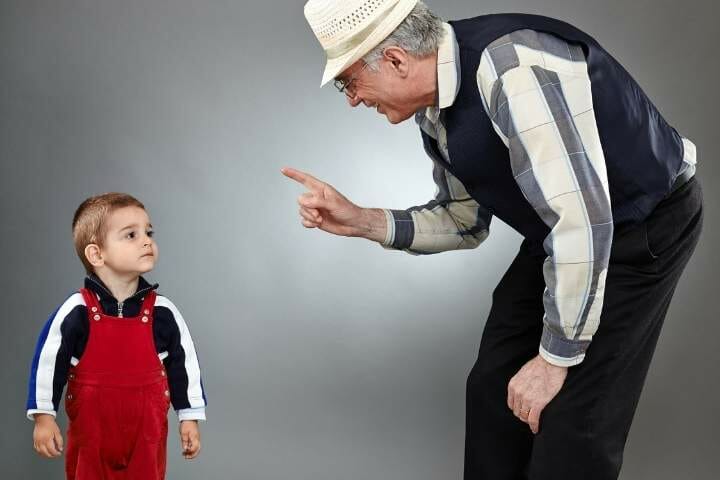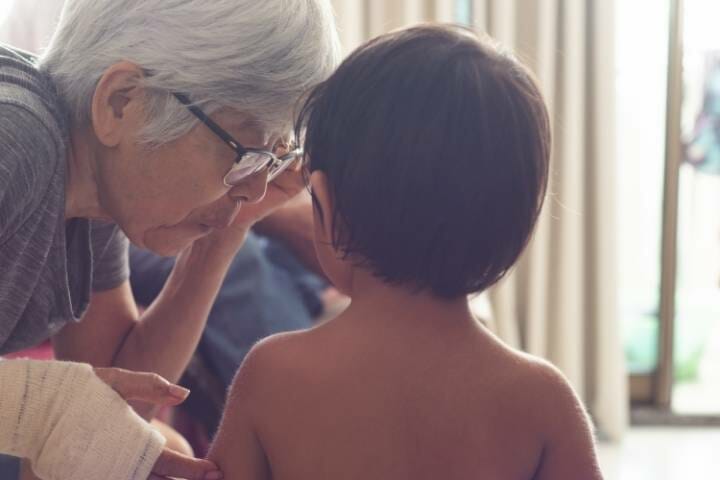Having grandparents involved in your children’s lives is a great experience for them. From spending holidays and birthdays together to passing on recipes and traditions to the youngest generation.

As much as we love our children and want to think they’ll always behave when spending time with their grandparents, they may misbehave a little bit.
Grandparents can feel uncomfortable discipling their grandchildren because they feel like it’s not their place, and it’s up to the parents as to how they want to parent their children.
So if a child is misbehaving or doing something grandparents know they shouldn’t, should grandparents step in a discipline them?
Unfortunately, there isn’t a clear-cut answer to this question.
Discipling children can be a very sensitive topic. Some parents have a really close relationship with their parents and agree as to how to raise children.
In this case, discipling their grandchildren may be alright because the parents and grandparents are in alignment about what is acceptable and what isn’t.
In other cases, if the relationship is strained then the grandparents may feel like they have to be careful about it so they don’t want to cause any issues with their child and their partner.
Many experts believe it will be best for the family and everyone’s relationships if you let the parents do the parenting. There are some situations, though, where grandparents should step in and say something.
Contents
Rude Behavior
No matter who the relationship is with, every person deserves to be treated with respect. You’re allowed to set the boundaries that work for you and what makes you the most comfortable.
In some cases, parents will allow behavior in their home that grandparents wouldn’t, and they wouldn’t even think it’s a problem because it’s how they are raising their children.
In the grandparent’s home, though, they may not find it acceptable or even rude and it’s completely ok to mention it and stop the behavior.
If it’s noticed that the grandchild is being rude to you or to other people, then it’s justified to say something in that moment.
It’s important to note one thing, though. It’s ok to say to them that they’re being rude and it’s not ok to talk to you or anyone else like that.
However, the grandparent should leave the discipling to the parents. Let the child know this is not ok but do not discipline them for it. Grandparent’s may have different forms of discipline, so just talk to the parents and let them know what happened.
Safety Risk
This one is pretty straight forward. If the child is doing something that is dangerous it’s completely understandable to step in and make sure the child is ok and is not going to hurt themselves or anyone else.
There may be some limits to this kind of action, though. So for example, if your grandchild doesn’t wear a helmet when riding a bike. If they are at your house, then it’s ok to set the rules that at your house they need to wear the helmet.
However, if you continue to bug their parents about making sure they wear the helmet the parents may feel as though you are undermining their parenting choices. You can set the rules at your house, but not for anyone else’s kids.

If you have concerns about larger safety issues, approach the parents when the children are not in the room or around. This way you can have a very open conversation about what’s going on and what your concerns are.
If you’re worried about how to approach this conversation without the parents feeling like you’re undermining their authority, let them know you are genuinely concerned and are coming from a place of love.
Nutritional Concerns
All grandparents want their children to be as healthy as they possibly can – no questions. In most cases, though, food is generally a topic best left to the parents to decide on.
Allergies aside, grandparents can choose what they want to serve at their house. However, it’s impossible to tell other people what kind of food they need to make at their house – especially the parents of your grandchildren.
If grandparents have concerns about the types of foods and snacks that their grandchildren are eating, they can encourage their grandchildren to choose snacks with a higher nutritional value.
This is not to tell them exactly what they need to eat, but rather discuss the options for snacks they have and what the benefits of each kind of food is and whether there are some foods with more nutritional value than others.
Helping grandchildren to establish healthy eating habits while at grandma and grandpa’s house can help them to make these same choices when they are elsewhere, too.
The bottom line is that the rules and limits set forth by the parents are not undermined. Again – it’s completely ok to make the rules that apply at your house but you can’t make the rules at other people’s houses.
Talking to Your (Adult) Children
When you become a grandparent, it’s a really exciting time and you can’t wait to spend all this time with this little one.
At some point, though, you will need to have a conversation with your adult children about how to handle behavior-related situations when they are at your house.
Spending time with your grandchildren should not come at the cost of them being rude to you or you being disrespected.
Many families don’t think to have these conversations with each other until a situation happens where there was unacceptable behavior – and sometimes that is too late, as people’s feelings are already hurt.
If possible, though, you may want to have this conversation before anything happens. If your grandchild is spending a lot of time at your house, you may want to discuss with your adult children what the rules and expectations are while they are at your house.
In some cases, parents will be ok with grandparents disciplining if something happens while others are not ok with it and prefer to do that at home.
Either way – if the conversation is had ahead of time it can save a lot of tension in the family and make sure no one feels as though their authority is being undermined.
Choose Your Words
If your grandchild is having a meltdown or is doing something that is less than desirable, chances are the parents already know about it. What’s more is they probably are not super happy about it, either.
Sometimes kids will behave in ways you never expected, or their meltdowns are just over the top.

The last thing parents need, during a time of a meltdown, is to be reminded that the behavior is unacceptable.
Calling them out when their child is misbehaving, which is an already tense situation, is probably going to cause additional tension and could harm your relationship.
If possible, try not to point things out when they’re happening and let your adult children handle the situation. If they ask for help or your opinion, then absolutely talk to them. Just try to resist the temptation of telling them ho you’d do it.
There Will Be a Generational Gap
Many grandparents today find that their adult children have very different styles of parenting than they had, and they teach their children in different ways than how they were raised.
If the children are safe and well cared for, those are the most important things. After that, it’s just a difference in styles of parenting.
It can be easy to forget that grandparents may have faced a little bit of pushback from their own parents in how they raised their own children.
Ways of raising children are constantly evolving, and all parents need to figure out that best way to do it themselves.
Your adult children may come to you and ask for your advice or what you did when you were faced with these situations but try not to offer any advice if it’s not asked for.
In Summary
Being a grandparent is a really exciting time, and there are so many memories you can make with your grandchildren. Sometimes, though, they have meltdowns and behavior that is less than ideal – it’s going to happen.
Ensuring that you don’t undermine the authority of their parents, and you make sure you are following the same general guidelines set out should allow for you to make it through these situations without causing tension to the family.
In issues of safety or serious concern for their wellbeing, it’s imperative to step in and say something. However, short of the best advice is to really let the parents do the parenting.
Ensure that you are not being disrespected and your grandchildren are following the rules of your house while they are visiting you, though.
If you have noticed things or have concerns, have an open and honest conversation with your adult children. Let them know what you have noticed, and make sure you let them know you are coming from a place of love and genuine concern for them and their wellbeing.
